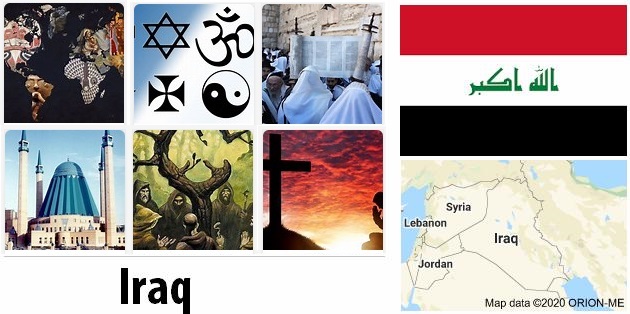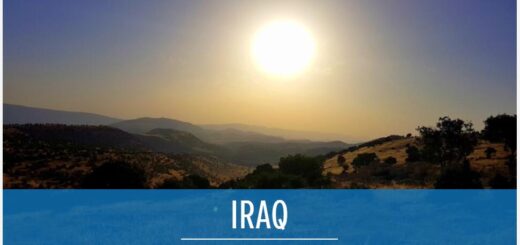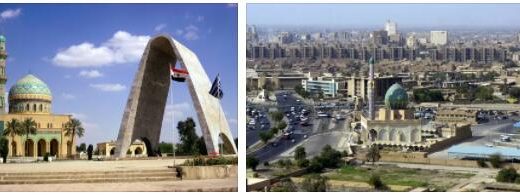Iraq Religion
Islam has long been an official religion in Iraq and an overwhelming majority of Iraqis are either Shia or Sunni Muslims. Sunnislam is the biggest direction internationally and in the rest of the Middle East, but not in Iraq. In Bahrain, Iraq is the only Arab country that has a predominantly Shi’ite population, around 60 percent (in neighboring Iran, the majority population is admittedly Shi’ite, but not Arabs without Persians).
The historic split between Sunnis and Shi’a Muslims arose in a dispute over who would succeed Prophet Muhammad after his death in 632. Shi’am, “Ali’s party,” considered that Muhammad’s cousin and son-in-law, Ali, and his descendants were the only legitimate successors to the Prophet. The two most sacred places of the Shiites in Iraq are Karbala and Najaf south of Baghdad. Most Shiite Muslims in Iraq see storayatolla Ali al-Sistani as their highest spiritual leader (marja), but others have chosen some other religious model. Several of the most powerful Shiite parties and militia groups in Iraq follow Ayatollah Ali Khamenei, Iran’s highest leader.
Within Shia and Sunni, there are various law schools, and they partly celebrate different weekends. But it does not always, and not everywhere, give rise to conflicts. A trained ear can hear differences between the prayer calls depending on tradition.
Most Christians belong to Oriental churches that originated before Islam, such as the Assyrian church of Nestorian origin and the unified Catholic or Chaldean community. Other communities are the Armenian-Apostolic and Syrian Orthodox churches.
Religious minorities
On both sides of the Iraq-Iran border in the south as well as in the big cities, before 2003 lived approximately 20,000-50,000 mandans, applying the only remaining Gnostic religion of antiquity. Central to their beliefs are Adam and John the Baptist. Today, fewer than 10,000 mandates are believed to remain in Iraq since thousands of refugees from war and persecution, many of whom went to Sweden.
Jews were once an important minority group in Baghdad and some other cities, but most left the country after Israel was founded in 1948, partly because anti-Semitic sentiments then grew in Iraq. Today, few Jews remain in the country.
- Countryaah: Population statistics for 2020 and next 30 years in Iraq, covering demographics, population graphs, and official data for growth rates, population density, and death rates.
Two religious groups are found mainly in Nineveh province in the north:
The Yazidis are a Kurdish-speaking group of hundreds of thousands of members. Many feel that they are Kurds (a view eagerly supported by Kurdish self-government) while others prefer to see themselves as their own people. The Yazidis apply a pre-Islamic religion with roots in ancient Persia, in which seven holy angels play a central role. The foremost of them, Taus, depicted as a peacock, has been identified by Christians and Muslims with the devil and the Yazidis have therefore been designated as devil worshipers. This has led to serious persecution both historically and in modern times (see below). The Yazidis celebrate a seven-day celebration when pilgrims visit a mountain in northern Iraq, where Adi ibn Muzafir, a central figure of the movement that operated in the 12th century, has its grave in the city of Lalish.
Ahl al-haqq or ahl-e haqq, also called kaka’i, is an ethnic-religious group that contains both Kurdish and Arabic speakers, but like the Yazidis is often identified with the Kurds. Their beliefs are similar in some respects to the Yazidis. There are close related minorities in Iran.
Religious conflicts
The Baath Party’s rule (1968–2003) was secular, but was dominated by Saddam Hussein’s Sunni Muslim relatives and allies. Shiite opposition groups were severely oppressed and the government banned the public celebration of some Shi’ite religious holidays and rituals. Shi’a Muslim wood carvings were forced away from their ancient settlements (see Population and Languages). Many Shiite Kurds, called cowards, were deported to Iran before the Iraq-Iraq war broke out in 1980 (see Modern History).
After the fall of Saddam Hussein in 2003, Shiite groups have come to dominate the government in Baghdad, at the expense of Sunni Muslims. Since then, bitter religious power struggles and armed struggles have raged almost continuously, especially between Sunni and Shi’ite Muslim groups. This is now a prominent issue in the country’s politics and has led to millions of people being forced to flee inside or outside the country. A new constitution from 2005 guarantees religious freedom, but in practice the country’s policy has been divided according to a kind of quota system between religious and ethnic groups (see Political system).
The worst battles have taken place in the years after 2006, when Shiite militias helped the US occupation army to defeat a Sunni insurgency, and after 2014, when the Sunni extremist group called the Islamic State (IS) took over large parts of the Sunni areas of Iraq. Suspicion between Sunni and Shi’a Muslims has increased sharply and today, the ethnic groups often live segregated from each other, due to widespread religious violence and massacres. A poll by PEW opinion poll 2011 showed that 14 percent of Iraqi Sunni Muslims did not consider Shiites as Muslims at all. Only 1 percent of Shi’ites believe that Sunnis are not Muslims.
Religious minorities have been trapped during the fighting. Many Christians fled the country after 2003, especially since extremist Islamists began kidnapping Christians and attacking churches. The Christian group is believed to have shrunk by at least half since then, and many who have stayed in Iraq have moved to Christian or Kurdish areas in the north. IS’s advance from the summer of 2014 hit the Assyrian-Syrian Christians in northern Iraq very hard. Many were forced to flee their home areas, while those who remained remained discriminated against, and eventually fled anyway.
The Yazid minority, which IS has called “Satan worshipers”, were also subjected to genocide-like persecution. Men who failed to escape were faced with the choice to convert or die, while women were taken hostage or sold as sex slaves in areas controlled by IS. One of the surviving women, Nadia Murad, has been involved in an international campaign against the use of sexual violence as weapons of war. When the Norwegian Nobel Prize Committee made the decision to give her the Peace Prize 2018, about 3,000 Yazidis were still missing, many probably dead, others still trapped in IS’s remaining enclaves.
2012
December
Increased number of civilian victims
The Iraq Body Count organization reports that 4,471 civilians have fallen victim to the ongoing conflicts in the country in 2012. This is a 10 percent increase from 2011 and the first increase in the number of civilian casualties in three years.
Serious conflict within the government
Tensions within the government are mounting since Sunni finance minister Rafi al-Issawi accused Prime Minister al-Maliki of having arrested his bodyguards.
The president is seriously ill
President Jalal Talabani from the Kurdish party PUK suffers a stroke. He is flown to Germany for care.
August
The Governor is kicked
The government dismisses the head of the central bank, which is seen by al-Maliki’s opponents as yet another example of the prime minister’s attempt to take control of independent institutions.
The Vice President is sentenced to death
The Sunni-Shiite tensions increase when Vice President Hashimi is sentenced in his absence to death for leading death patrols as murdered political opponents (see December 2011 and May 2012). Hashimi dismisses the death sentence as politically grounded and urges Iraqis to rebel against al-Maliki’s Shiite-dominated government.
July
Mass attacks by Islamic State
About 115 people are killed and over 300 injured on July 23 in concerted attacks in 13 cities around the country. It is the bloodiest day so far since US troops left Iraq. The Islamic State of Iraq is taking on the attacks.
May
Criticism against Kurdish oil exports
The central government reacts strongly to the Kurdish autonomy’s decision to export oil and gas directly to Turkey through pipelines to be built in the coming year. A sharply worded note to Ankara states that the lines must not be built without the approval of the Iraqi government (see Natural Resources and Energy).
The Vice President called
Iraq’s report against Hashimi at Interpol leads to an international search. Hashimi faces trial in his absence in Baghdad, but Turkey does not intend to extradite him (see December 2011).
February
Sharp conflict Sunni-Shia
The charges against Vice President Tariq al-Hashimi help to sharpen the contradictions between Sunnis and Shiites. During the month, the number of attacks against Shia Muslims increases.
January
Sunnis back in Parliament
At the end of the month, the Sunni boycott is canceled by Parliament (see December 2011). In early February, the Sunni politicians who protested also resumed cooperation with the government. However, the charges against Hashimi are repeated by a legal commission which claims that he was behind at least 150 murders.
Islamic State kills Shiites
At least 28 people are killed by a car bomb in a Shiite-dominated district in Baghdad. It is an example of many of the Islamic State’s constant attacks on Shia Muslims, which have been going on ever since the group was formed in 2006.
Designated terrorists are executed
34 people are executed for “terror-related crimes”. The mass executions receive harsh criticism from UN Human Rights Commissioner Navi Pillay.



